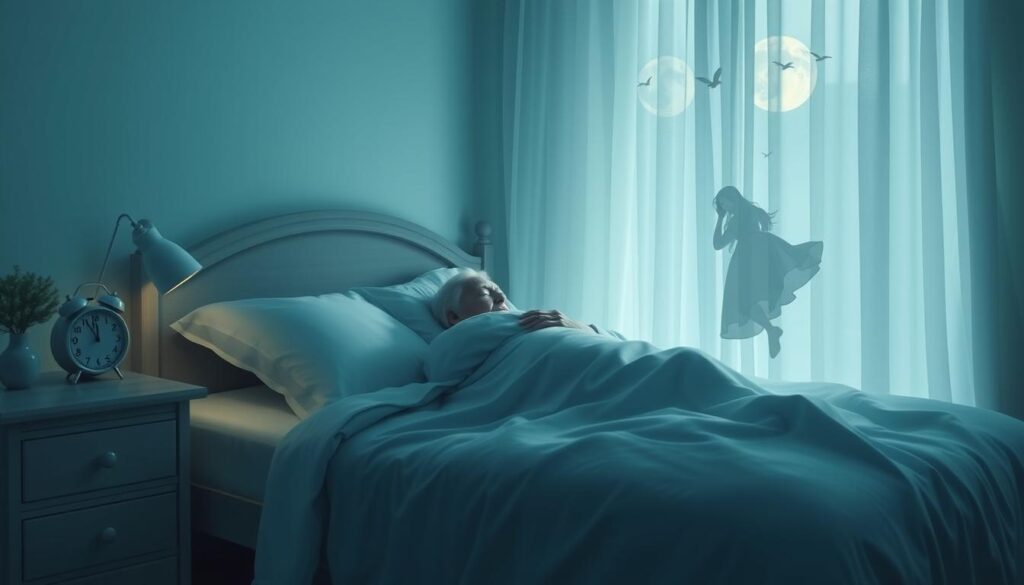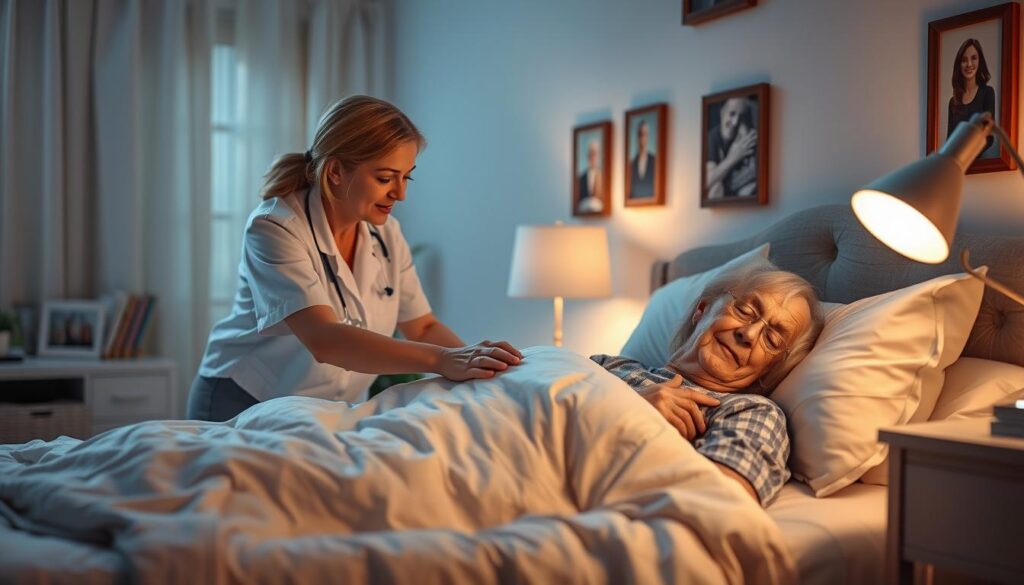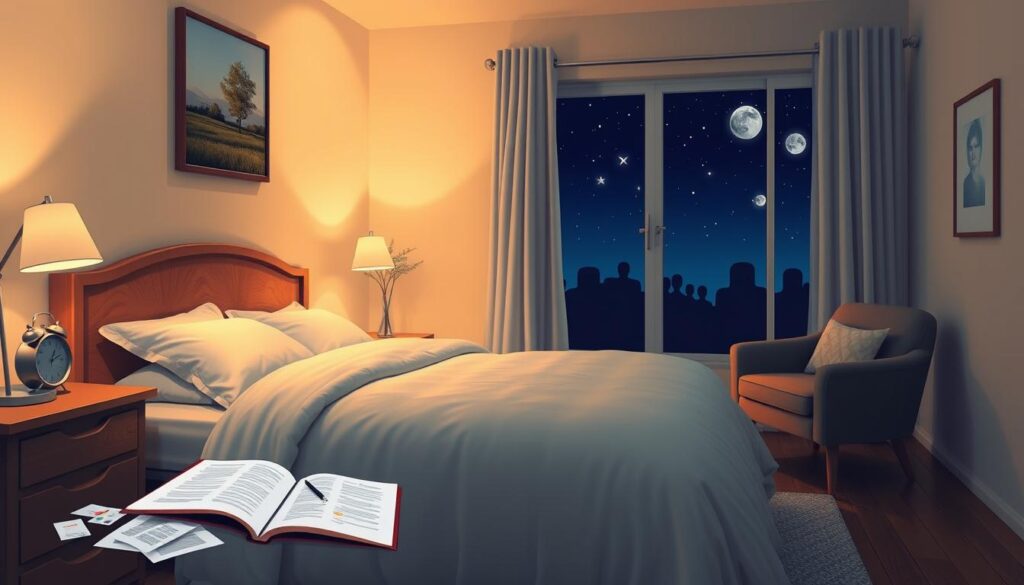- April 27, 2025
Welcome to Dementia World elderly home services



Did you know that about 40% of people with late-stage Alzheimer’s spend their nights awake? This shows how neurodegenerative diseases like Alzheimer’s can deeply affect sleep quality. Sleep problems are common in those with dementia, leading to memory loss and making life harder for caregivers.
We will look into how dementia affects sleep, including common sleep issues and ways to improve it. Understanding this connection is key to better health and well-being.
Sleep problems greatly affect people with dementia and their caregivers. About 25% to 50% of older adults with Alzheimer’s face sleep issues. These problems worsen cognitive decline and make caregiving harder.
Knowing the types of sleep problems in dementia helps find better ways to improve sleep. This is key for better health and daily life.
Sleep issues are common in dementia. Around 25% of adults with dementia have big sleep problems. In care homes, up to 80% may have sleep apnea.
Other sleep disorders, like periodic limb movements, can also reduce sleep time. Environmental factors, like noise and lack of natural light, play a role. This makes it important to look at where people live.
There are many sleep problems, like feeling very sleepy during the day. Falling asleep hard and sundowning are also common. Sundowning makes people confused and agitated in the evening.
Pain in older adults in care homes also leads to sleep issues. The Sleep Disorders Inventory shows how big a problem this is. It highlights the need for good management strategies.

The link between dementia and sleep is very complex. It greatly affects how well people think and their overall health. Studies show that good sleep is key to keeping memories sharp and preventing cognitive decline in diseases like dementia.
A Finnish twin study found that bad sleep habits can lead to lower brain function. Long sleep times were linked to a higher risk of Alzheimer’s disease. This shows how important good sleep is for our brains.
Research on older adults in Sweden was very worrying. Those with sleep problems were 70% to 100% more likely to get dementia or Alzheimer’s within nine years. This highlights how sleep quality is vital for keeping our minds sharp.
Almost 60 to 70% of people with cognitive issues have trouble sleeping. Even those in care homes often don’t sleep well, being neither fully awake nor asleep for long periods.
To show these links clearly, here’s a table with some key findings:
| Study | Findings |
|---|---|
| Finnish Twins Study | Short/long sleep duration linked with lower cognitive scores; long sleep increased AD risk by 1.8 times. |
| Swedish Adults Study | Decreased sleep depth/duration raised incident dementia odds by 70-100% after 9 years. |
| Composite Sleep Disturbance Index | Higher scores correlated with 23% greater dementia odds over 4 years. |
| Older Men Study | Poor sleep efficiency indicated greater cognitive decline; self-reported poor sleep quality linked to executive function decline. |
| Sleep-Disordered Breathing (SDB) Study | SDB at AHI ≥15 associated with 1.9 times the odds of mild cognitive impairment or dementia within 5 years. |

The role of sleep in brain health is huge, even more so in diseases like Alzheimer’s. Bad sleep can make cognitive problems worse. This makes it very important for caregivers and doctors to focus on sleep.
It’s important to know what causes sleep issues in people with dementia. These causes fall into two main groups: physical and mental health problems, and environmental factors. By tackling these, we can improve the lives of those with dementia.
Many health issues can mess with sleep for dementia patients. Chronic pain makes it hard to sleep well. Conditions like obstructive sleep apnea also hurt sleep quality.
Studies show that people with insomnia are more likely to get dementia. Health problems like high blood pressure, diabetes, and depression can also mess with sleep. This is because their medicines can affect sleep.
Dementia changes how the body makes melatonin, making it hard to fall asleep. Not being active can make this worse. This leads to problems like trouble falling asleep, waking up a lot, and sleeping less.
Things around us can also affect sleep. Unfamiliar places, bad lighting, and too much noise can make sleep worse. Dementia patients might think it’s morning at night, which can be dangerous.
Creating a good sleep space can help. It makes the environment better for sleep, helping everyone get a good night’s rest.

Caregivers are key in helping people with dementia sleep better. Sleep problems like too much sleep and trouble falling asleep are common. Caregivers’ emotional support is vital in improving sleep quality.
This support is not just about listening. It’s also about reassuring them, which helps reduce anxiety. Anxiety can be a big problem for those with dementia.
Emotional support is essential for caregivers. People with dementia often feel restless and confused, which gets worse in the evenings. This is called sundowning.
It leads to more wake-ups at night. Caregivers can help by doing calming things before bed. This can reduce anxiety. Having a daily routine is also helpful for better sleep.
It’s important to reduce stress in caregivers. About 40% of them don’t get enough sleep, which is hard with Alzheimer’s care. To lower stress, caregivers should get professional help and take care of themselves.
Good sleep habits are key. Try to avoid napping too much and stay active during the day. This helps you sleep better at night.

| Caregiver Strategies | Impact on Sleep Quality |
|---|---|
| Structured Daily Routines | Improved rest for caregivers and patients |
| Engaging in Calm Pre-Sleep Activities | Reduced insomnia in individuals with dementia |
| Avoiding Stimulants in the Evening | Enhanced sleep quality for caregivers |
| Using Nightlights | Maintained a peaceful sleeping environment |
Caregivers play a big role in improving sleep for those with dementia. They help with both emotional and physical health. This shows how important it is to take care of both the caregiver and the patient.
Spotting sleep disorders in dementia patients needs a detailed look. This includes gathering sleep history from caregivers. Issues like too much daytime sleep and trouble sleeping at night are big problems. These issues affect both the patient and the caregiver, causing more stress.
Using the right assessment tools is key to understanding these sleep issues. Sleep diaries track nightly activities, and rating scales measure how bad the sleep problems are. Symptoms like waking up a lot and strange behaviours at night are common. These can make patients feel confused and upset in the evenings.
The table below outlines important points for identifying sleep disorders in dementia patients:
| Symptom | Details |
|---|---|
| Excessive Daytime Sleepiness | Commonly reported by caregivers, impacting cognitive function for patients. |
| Nocturnal Restlessness | Includes behaviours such as moving about at night or frequent awakenings. |
| Reduced Slow-Wave and REM Sleep | Dementia patients show notable reductions in restful sleep stages. |
| Disruptive Nighttime Behaviours | May include talking, yelling, or distressing vocalisations. |
| Insomnia | Often linked to increased anxiety and agitation, particulary during evening hours. |
Healthcare professionals can create special nursing interventions after a detailed check-up. Practices like regular sleep times and avoiding naps during the day can help. Keeping an eye out for sleep disorders helps dementia patients and eases the burden on caregivers.

Dealing with sleep problems in dementia needs a mix of solutions. Making the environment sleep-friendly is key. This means controlling noise and light levels to reduce anxiety and confusion.
A sleep-friendly space is vital for dementia patients. Using night lights can help those afraid of the dark, a common issue. Also, keeping the room quiet and cool, around 18°C, improves sleep. This makes it easier to rest and can help with sleep disorders.
Having a regular sleep schedule helps those with dementia. Eating and sleeping at the same times each day helps the body clock. Activities like a warm bath or soft music before bed can help you relax and sleep better. Avoiding caffeine after lunch is also important, as older people are more sensitive to it.
There are many non-medical ways to improve sleep. Activities like walking or gardening can help. Cognitive-behavioural therapy, relaxation techniques, and bright light therapy also work well. These methods are safer than sleep medicines for older adults.
Medications greatly affect the sleep quality of dementia patients. It’s key to understand how they impact sleep to manage sleep problems well. Some medicines can make sleep worse, so regular health checks are important to manage them right.
Many types of medicines can cause sleep issues in older adults, including those with dementia. Below is a list of common medicines and how they might affect sleep:
| Medication Class | Common Examples | Impact on Sleep |
|---|---|---|
| Antidepressants | Fluoxetine, Sertraline | May cause insomnia or disrupted sleep patterns |
| Benzodiazepines | Diazepam, Lorazepam | Increased risk of delirium and cognitive decline |
| Antihistamines | Diphenhydramine (Benadryl) | Potential for long-term cognitive impairment |
| Cholinesterase Inhibitors | Donepezil, Rivastigmine | Can lead to sleep disturbances and vivid dreams |
Seeing a healthcare professional regularly is essential for managing medication’s effect on sleep. Changing how much or when you take your medicines can really help your sleep. Doctors can also reduce risks from taking too many medicines at once.
Studies show that long-term use of some medicines, like sleep aids and benzodiazepines, might increase dementia risk. Keeping an eye on your medicine use and trying non-drug sleep solutions, like therapy, can improve sleep without the bad side effects of medicines.
Restless Legs Syndrome (RLS) greatly affects sleep in people with dementia. It causes a strong urge to move the legs and uncomfortable feelings. This makes it hard to get a good night’s sleep.
Symptoms get worse when people are not moving, like in the evening or at night. This is similar to sundowning in dementia, making sleep even harder to manage.
Those with RLS struggle to fall asleep and stay asleep. This leads to feeling very tired during the day. Other dementia symptoms, like being aggressive or irritable, can make it hard to diagnose and treat RLS.
Studies show RLS affects 2.4% to 10.8% of Caucasians. But it’s less common in East Asia and South America. Having RLS can also increase the risk of getting dementia, with a risk ratio of 1.46.
There are many ways to manage RLS in dementia patients. Fixing any underlying issues, like iron deficiency, is key. Simple changes like stretching and regular sleep times can help.
Medicines like dopamine agonists might be needed for severe cases. But, their effect on dementia risk is not clear. Doctors must be careful, using scales like the International Restless Legs Rating Scale. This ensures the right treatment without causing more problems.
Understanding how dementia and sleep are linked is key to better health for both patients and their caregivers. Many people with dementia struggle with sleep, which can harm their thinking skills and happiness. This summary highlights the need to tackle sleep problems early, as they could affect up to 70 million in the US.
By spotting signs of sleep trouble and using good sleep tips, caregivers can make a big difference. Creating a regular sleep schedule and a supportive sleep space are vital. Also, talking openly with doctors is important for diagnosing and treating sleep issues.
By focusing on sleep, we can manage dementia symptoms better. This leads to a more enjoyable life for both patients and their caregivers. As research grows, we’ll find even better ways to help with dementia and sleep problems.
About 25% to 50% of people with Alzheimer’s have big sleep problems. They might feel very sleepy during the day or have trouble falling or staying asleep.
Dementia changes the brain, messing up sleep patterns. This leads to memory loss, feeling tired during the day, and other problems.
Sleep issues come from physical health problems, like chronic pain. Mental health issues, like anxiety and depression, also play a part. Plus, things like bad lighting and too much noise can make it worse.
Caregivers offer emotional support and help reduce their own stress. This helps improve the sleep of those with dementia.
To spot sleep disorders, caregivers talk about sleep history and watch for signs like daytime sleepiness. Sleep diaries are also useful tools.
To help sleep, create a quiet, dark room and stick to a bedtime routine. Try non-drug treatments like cognitive-behavioural therapy too.
Some medicines, like antidepressants and cholinesterase inhibitors, can make sleep worse. It’s important to talk to doctors about this.
RLS makes people feel like they must move their legs, causing discomfort. It can ruin sleep. Treatment includes lifestyle changes and medicines.